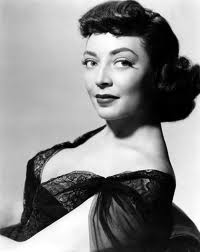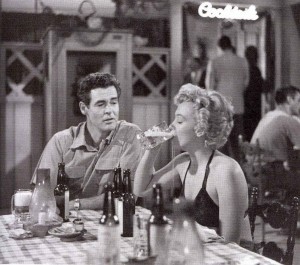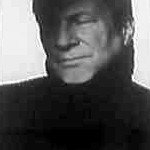By Film Noir Blonde and Mike Wilmington
The Film Noir File is FNB’s guide to classic film noir, neo-noir and pre-noir on Turner Classic Movies (TCM). The times are Eastern Standard and (Pacific Standard). All films without a new review have been covered previously in Film Noir Blonde and can be searched in the FNB archives (at right).
Pick of the Week: TCM’s Summer of Darkness continues to delight
Friday, July 24
The next-to-last chapter of TCM’s deluxe film-noir binge-a-thon Summer of Darkness commences today. It’s another feast for film noir buffs. As we know by now, Turner Classic Movies has been sharing its great shadowy treasure trove of classic film noir on Friday nights.
This week’s dark list includes Richard Fleischer’s terrific low-budget death-rides-the-train sleeper, “The Narrow Margin,“ starring Charles McGraw and Marie Windsor — one of director Billy Friedkin’s faves. You’ll also see Hollywood expressionist John Brahm’s stylish triple-flashback thriller, “The Locket” with Robert Mitchum. And don’t even think about missing Otto Preminger’s French critical favorite “Angel Face“ (one of Jean-Luc Godard’s picks for his all-time Best American Talkies list). This time Mitchum is smitten with Jean Simmons. Bitch-slap trivia: “Angel Face” is the movie where Mitchum punched Preminger for being mean to Jean.
Also on Friday’s all-day bill of noir: highlights with ace actors like Ida Lupino, Robert Ryan, Mitchum, Barbara Stanwyck, Mickey Rooney, Evelyn Keyes, Jane Russell, Jeanne Moreau, Vincent Price, John Payne and Raymond Burr, and directors like Nick Ray, Josef von Sternberg (on the same show), Louis Malle, Phil Karlson and Fritz Lang.
Curated and hosted in the evening by the Czar of Noir himself, Eddie Muller of the Film Noir Foundation and the Noir City film festivals, TCM’s Summer of Darkness is a standout fest of classic killings, broken dreams and movie nightmares. All that and Marilyn Monroe (in “Clash by Night”) too.
We don’t want this summer to end!
6:45 a.m. (3:45 a.m.): “Roadblock” (1950, Harold Daniels). Charles McGraw and Joan Dixon in a poor man‘s “Double Indemnity.”
8 a.m. (5 a.m.): “The Strip” (1951, Leslie Kardos). Mickey Rooney is a luckless jazz drummer who gets in a bad fix trying to help Hollywood hopeful Sally Forrest. The great guest musical stars here include Louis Armstrong, and Satchmo’s longtime friends and sidemen Jack Teagarden and Earl Hines.
9:30 a.m. (6:30 a.m.): “Beware, My Lovely” (1952, Harry Horner). Ida Lupino and Robert Ryan strike sparks in an icy domestic suspenser.
11:15 a.m. (8:15 a.m.): “Clash by Night” (1953, Fritz Lang). Barbara Stanwyck is an independent woman in 1950s America. Trouble, here we come! She can’t keep a man, but then who’d want to when edgy Robert Ryan is around to get in trouble with? Marilyn Monroe is splendid as a small-town factory girl.
1:15 p.m. (10:15 a.m.): “Kansas City Confidential” (1952, Phi Karlson). A good crisp Karlson heist, pulled off by a mob that includes Preston Foster and Colleen Gray.
3 p.m. (12 p.m.): “Macao” (1952, Josef von Sternberg & Nicholas Ray).
4:45 p.m. (1:45 p.m.): “Talk About a Stranger” (1952, David Bradley). Gossipers wreak havoc in a talky small town. A look at U. S. Senator George Murphy and First Lady Nancy Davis (Reagan) in their movie days.
6:15 p.m. (3:15 p.m.): “Split Second” (1953, Dick Powell). In this nerve-racking thriller, outlaw Stephen McNally and hostages Alexis Smith, Jan Sterling and others are trapped together in a desert nuclear bomb testing site.
8 p.m. (5 p.m.): “The Narrow Margin” (1952, Richard Fleischer).
9:30 p.m. (6:30 p.m.): “His Kind of Woman” (1951, John Farrow).
11:45 p.m. (8:45 p.m.): “The Locket” (1946, John Brahm).
1:30 a.m. (10:30 p.m.): “Angel Face” (1953, Otto Preminger).
3:30 a.m. (12:30 p.m.): “Elevator to the Gallows” (1958, Louis Malle).













From FNB readers